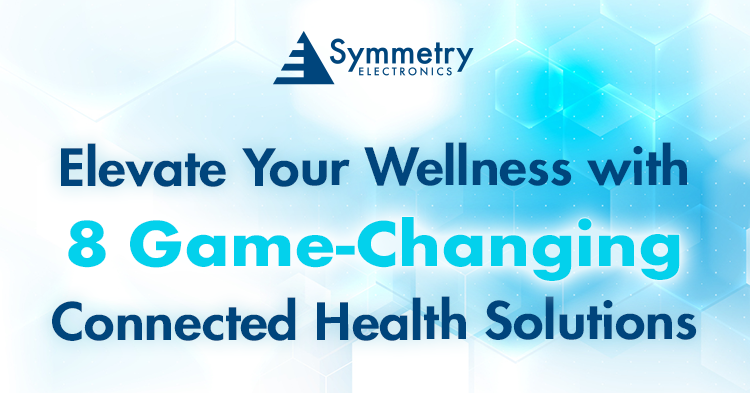- Home
- Braemac Blog
- Elevate Your Wellness with 8 Game-Changing Connected Health Solutions
Elevate Your Wellness with 8 Game-Changing Connected Health Solutions
About Jari Haiston
.png)
Connected health solutions refer to a broad category of healthcare technologies and services that utilize digital communication and information technologies to connect patients, healthcare providers, and medical devices in order to deliver more efficient, convenient, and effective healthcare services. Connected health technologies often leverage the power of the internet, mobile applications, wearable devices, telemedicine, and other interconnected platforms to enhance patient care, monitor health conditions remotely, streamline data collection and analysis, and improve overall healthcare outcomes.
How Is Connected Technology Revolutionizing Healthcare?
Connected health solutions aim to improve patient outcomes, enhance patient engagement, and enable more personalized healthcare experience, but what’s the technology behind it? The Internet of Medical Things (IoMT) is a subset of the broader Internet of Things (IoT) concept, specifically focused on medical devices and healthcare applications. Connected health solutions heavily rely on IoMT, as the devices and sensors used for remote patient monitoring and data collection are part of the Internet of Medical Things.
Connected health solutions utilize IoMT to transform healthcare delivery by enabling continuous data monitoring and improving patient outcomes through remote and personalized care. The statistics backing connected health innovations validate the popularity of their integration. Grand View Research reports that the global connected health and wellness solutions market size was valued at USD 45.71 billion in 2022 and is expected to grow at a compound annual growth rate (CAGR) of 20.1% from 2023 to 2030. Relevant also found that in 2015, there were already 4.5 billion connected devices in healthcare environments. That number may well have increased to 20-30 billion by now.

8 Types of Cutting Edge Connected Health Innovations
With the average US hospital room integrating 15-20 connected devices, it’s clear how much healthcare systems are already relying on connected health solutions. However, connected health innovations don’t stop at ER doorways. Discover 8 cutting-edge connected health solutions that extend in and out of the ICU:
1. Telemedicine and Telehealth
Virtual consultations and remote monitoring of patient health conditions through video conferencing and remote healthcare monitoring systems. Made a popular and convenient way to receive treatment from your home during COVID, virtual appointments are still trending in a post-pandemic environment. According to McKinsey, Telehealth utilization has stabilized at levels 38X higher than before the pandemic.
2. Wearable Devices
Devices like smartwatches and fitness trackers collect and transmit health-related data such as heart rate, sleep patterns, and physical activity to healthcare providers and patients. Medical wearables aid users in engaging with their own health. They are critical tools in preventative care as they incentivize personal management of health habits.
3. Health Apps
Mobile applications that assist users in managing their health, tracking medications, and providing a personalized health advice. MyFitnessPal is a highly popular health and fitness app designed to help users manage their nutrition, track their physical activity, and achieve their health and fitness goals. The app provides a comprehensive platform that integrates calorie tracking, exercise logging, and personalized health insights.

4. Remote Patient Monitoring
Remote patient monitoring (RPM) devices are medical devices and technologies used to monitor patients' health remotely and collect vital health data outside of traditional healthcare settings, such as hospitals or clinics. These devices enable continuous monitoring of patients' health conditions, allowing healthcare providers to track their progress, detect changes, and intervene promptly when needed.

5. Healthcare Robotics
Robotic devices and systems are being used in surgery, rehabilitation, and elderly care to improve precision, efficiency, and patient outcomes. Moreover, integrating robotics is becoming an increasingly normal part of the healthcare experience. For example, surgical robots allow surgeons to operate with a high level of accuracy and precision.
6. IoMT-Enabled Smart Hospitals
IoMT integration in hospitals enables connected medical devices and systems to communicate and share data securely. This enhances operational efficiency, patient monitoring, and resource management. IoMT-enabled smart hospitals consist of an entire connected ecosystem that leverages digital technologies to create a seamless healthcare experience.
7. Blockchain for Health Data Security
Blockchain technology is being explored to enhance health data security and privacy. It allows secure and transparent storage and sharing of patient records while reducing the risk of data breaches. Blockchain for health data security is a decentralized and immutable digital ledger technology that provides a secure and transparent way to store, manage, and share health-related information.
8. Artificial Intelligence (AI) in Healthcare
AI-powered diagnostic tools can analyze medical images, such as X-rays, CT scans, and MRIs, with high accuracy. AI algorithms assist healthcare professionals in detecting and diagnosing conditions more efficiently. AI can be a pivotal tool in preventative care. For example, skin cancer is one of the most common types of cancer globally, and early detection is crucial for successful treatment. AI can be used to develop advanced diagnostic tools to assist dermatologists in identifying skin cancer at an early stage and improve patient outcomes.
Developing a Connected Health Future
Interconnected technologies offer numerous benefits, such as improved access to healthcare services, enhanced patient engagement, better data-driven decision-making, and the potential for early intervention and preventive care. If you’re a developer interested in revolutionizing healthcare with a cutting-edge connected health solution, our expert team of applications engineers are uniquely positioned to assist you in successfully deploying your healthcare vision. Knowledgeable in IoT, IIoT, and IoMT, our team can provide you with the latest innovations that directly align with your device’s specific application and use case.
Consultation is free and available throughout your design cycle. Don't miss the opportunity to build a healthier and connected world together. Contact Symmetry Electronics today!
